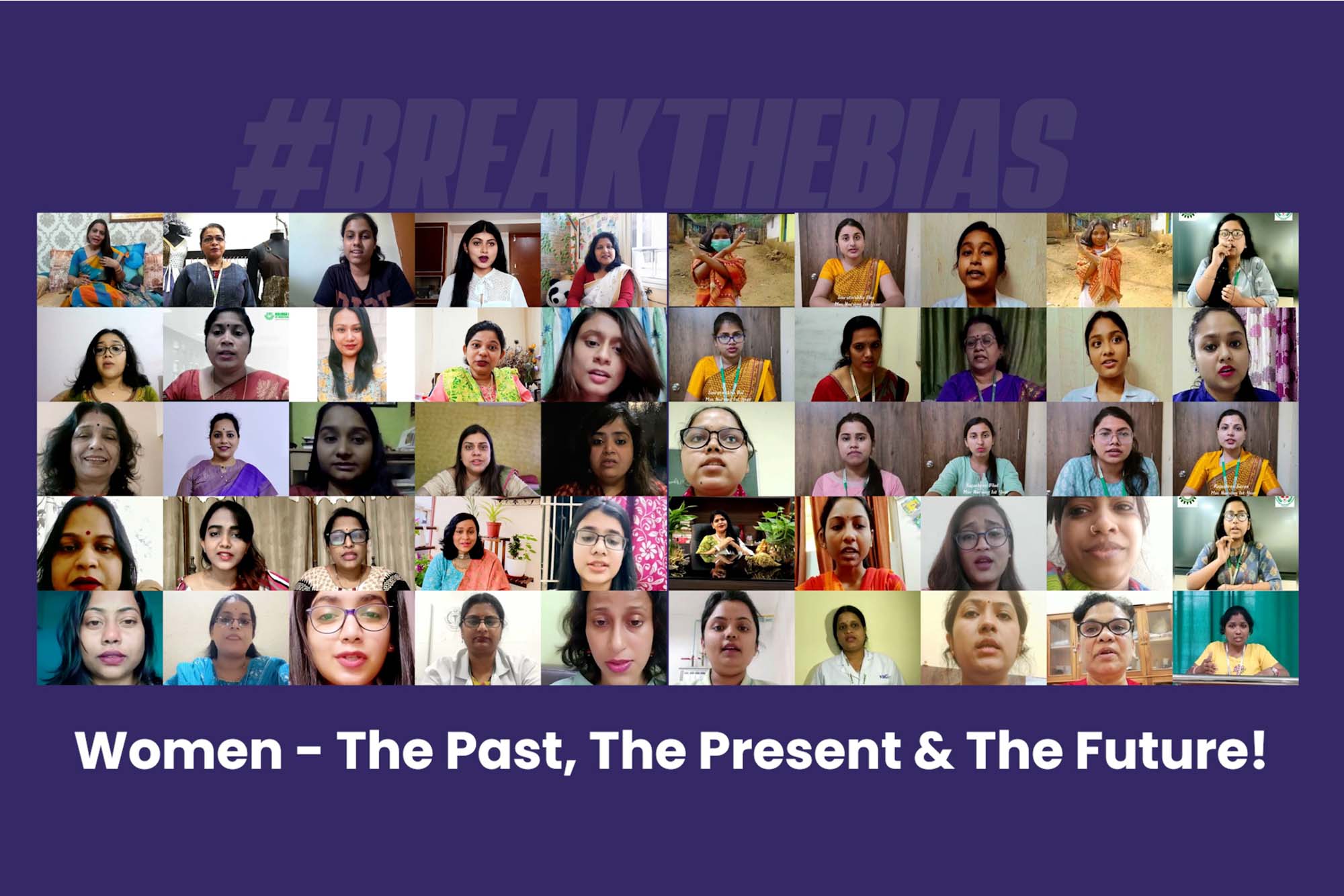India as a nation is revered in a feminine form, i.e., the Bharat Mata; many important government posts are occupied by women; and educated women are pouring into the professional workforce with profound implications for national and multinational corporations. Birth of a girl is equated with coming of wealth and it is compared with Laxmi, the goddess of wealth.
However ironically, these are accompanied by news about dowry killings, female infanticide, domestic violence against women, rape, illegal trafficking and prostitution and myriad others of the same type. Gender discrimination prevails in almost all areas, be it social, cultural, economic or educational. The battle of a girl child starts even before the day she is born. She is ‘fortunate’ if she is permitted to be born. Even after birth, the girl child faces discrimination and oppression. This continues through childhood, adulthood, marriage, old age till death.
Throughout history, the central role of women in society has ensured the stability, progress and long-term development of nations. A nation is empowered only when women and girl children are equal partners as men. In the words of Swami Vivekananda, “Countries which do not respect women have never become great, nor can they ever become in future.” Women empowerment is a gateway to peace and development for a nation or society at macro level and family or organisation at micro level. There is progress only when there is gender parity and women are respected and treated as equal with men.
The Kalinga Institute of Social Sciences (KISS) and the Kalinga Institute of Industrial Technology (KIIT), premier educational institutions of global repute, from the beginning have created a space for equal representation of genders across the spectrum in everyday functioning. It has been my principle from the start that sees its manifestation in gender equity in the KIIT and KISS ecosystem. We have, by all means, created an equal pedestal for both men and women when it comes to accessibility, decision-making, co-creating a safe environment for staffs and students, zero tolerance to any form of gender-based violence, extending support to the victims of abuse to turn the barriers that women face upside down by its horns.
Besides the holistic empowerment of all at the KISS through a complete curricular, vocational and life skills education, sports, arts and cultural education, we have initiated various programmes for a sustainable change. Of the total student strength of the institute, girls account for about 60%. “If we educate a girl, we educate a family and a whole nation” has been the guiding light for the KISS right from the start. Girl children, besides core curricular education, are also encouraged to participate in sporting activities, life skills education (including reproductive and sexual health education), and various vocational education for economic empowerment. They have been supporting their families and themselves under the institute’s “Earn-while-you-learn” scheme and thereby picking up many income-generating skills. With all these facilities, these tribal girls are going to be, in fact, are working as the much-needed social change agents in their respective communities and thereby fulfil a major global development goal of the United Nations.
The humanitarian initiatives we started such as Art of Giving, New Mind-New Dreams, Society, Humanity & Spirituality, Life-skills Education, Education for all and especially Kanya Kiran are all awareness campaigns aiming to promote equal rights to education, employment, status, health and hygiene of women and girl children. Supporting the fact are examples of rising stars, Olympian and national champion, sprinter – Dutee Chand, Baseball player-Geeta Bhuyan, Rugby player – Hupi Majhi, Sabre Fencer – C. A. Bhavani Devi, Kho-Kho player – Mandakini Majhi, Chess player – Aparajita Kochhikar, all students from both the institutions are change-makers who have garnered public attention for their significant achievements and have proven that women are no less than their male counterparts both, in intellectual and physical abilities.
Women’s Day, in other words, is a celebration of the role of women and the constant fight for gender equality. But with the presence of many people who envision empowering women in every field, we are not very far from attaining global progress of equal rights. Had it not been for our belief that each person, whether man or woman, has an equal opportunity for the maximum scope, a remote village, Kalarabanka (Samanta’s native place) now turned into a smart village would not have been able to coeducate girls in English nor it would have been possible for tribals girls to carve their names in golden letters who otherwise would have held guns of the Naxals instead of pens.
Be it staff or a student, KIIT and KISS Foundation have always been thoughtful about the women and constantly been exchanging all support for their growth. For that very reason, these women feel assured and acknowledged, and in return, they continuously lend their support and hence have a tremendous contribution to the growth of these two prestigious institutions recognised globally. That testifies that if women are empowered, they can make a huge difference in the progress of society and thus the nation.
It is just the start! Firm initiatives must be taken to help women make their own decisions and not conform to all the standards that society and their family has set for them. Making women independent in all aspects from thought, mind, decision and wealth should make its way to the top of every social and economic reform that can bring a remarkable difference in society. The nation can progress when women progress!
Just like us, if everyone becomes the voice of the unheard and uses his or het power in the greater interest of society, what can stop women and what can stop the world!



For thousands of years, women were subservieant to men.
The lineage in most cultures generally follows the male line of the family.
No rules or religion says so, but most male and his family prefers it that way.
WOMEN IN THE PAST
The old addage of women “barefoot and pregnant” exists in most areas of the world.
Women are not allowed to make major decisions in the family and are expected to submit in all things to the husband.
They cannot own anything, and they are not permitted to go to school.
Education is not permitted for women in the past.
Education was only for the males in the past.
It was never encouraged for women.
In the far distant past, women’s role was to bear young and care for them.
As part of that, women have traditionally been very involved in food preparation, which in many cultures expanded to include agricultural efforts to raise food as well as collecting water, gathering fuel for cooking, and making of objects needed by the family such as clothing.
-Women are not dominant in business too.
They are used in used in the work areas like agriculture or Handicraft just to benefit from their physical power.
They were no difference than slaves.
-They are not allowed to use their brain in any circumstances as their thoughts won’t be bothered to be listened. In the middle east country like Egypt and Turkey, women are not allowed to voice out their opinion.
-Women are excluded from public roles in religious life.
Women are not expected to participate in public prayers.
-Women must only live to serve men.
Women are not allowed to decide life for their own.
They are labelled weak and always dependable to others to live.
In Thailand, women are not allowed to divorce until 90s.
They have to live with their life partner even if they like it or not. -Women are not inherited with any inheritance, not even from the father or husband.
Woman are always treated lower than men n order to have constant control on them.
. Women in the present are anyhow different from the past.
Women in 21st era are different.
They have vision and mission.
They stopped serving as equal to slaves but serve themselves more now.
WOMEN IN THE PRESENT
-Women now are more brave.
They are entitled with proper education.
By having education, women don’t doubt themselves and become confident.
-Women are no longer swallowed by shadows of men.
They voice out their point of view.
Nevertheless, they are an important asset in our society.
Their intelligence and willpower are not mistreated.
They are needed for creating new changes massively.
They could be said as the women behind a man’s success.
Men are like diamonds but women now are like the gold base beneath it. Without women.
It Seems hard to take steps. -It would be inappropriate to say that their role have changed, but instead they have taken new roles along with the role they used to play earlier.
Women earlier had the role of home maker alone, now they are the bread earner and home maker together.
-Women now could make big changes in people’s life instead of only making changes for family like how women in the past did.
Things have changed a great deal over the last 300 years ever since women won the right to vote near the beginning of the twentieth century.
Women in the past and present are not too different.
They have been improving themselves in order to live a better life.
As time passes, women learn from their mistakes the generalizations have many more exceptions in today’s world.
Women in the future would be ruling the Nation instead of helping men side by side.
That’s the vision of women in future.
To create better life than present.
Now is never enough.
WOMEN IN THE FUTURE.
KIIT KISS are exemplary for Women’s Empowerment through Education & Sports as mentioned by HF Sir.
They have earned reputation Nationally & Internationally bringing laurels for the Organisation, their Families & to Country.
🙏🙏🙏
Hon’ble Sir, thanks a lot for bringing the whole of the art & craft with regard to a girl child to lime light. My only humble request to you Sir, for arranging to frame such stringent actions against any kind of ill-treatment towards gild children. Then only the soil of our country will keep on smiling.
Well it was certainly much easier for many single men back in the old days to find love since most women were very old fashioned and real ladies back then, and today most women are very horrible to meet thanks to feminism.
Yes rightly pointed out by our esteemed founder Prof Achyuta Samanta Sir that a nation progresses when women progress..we are happy women working @kiit, KISS and Kims..hats off Sir👍👍👏